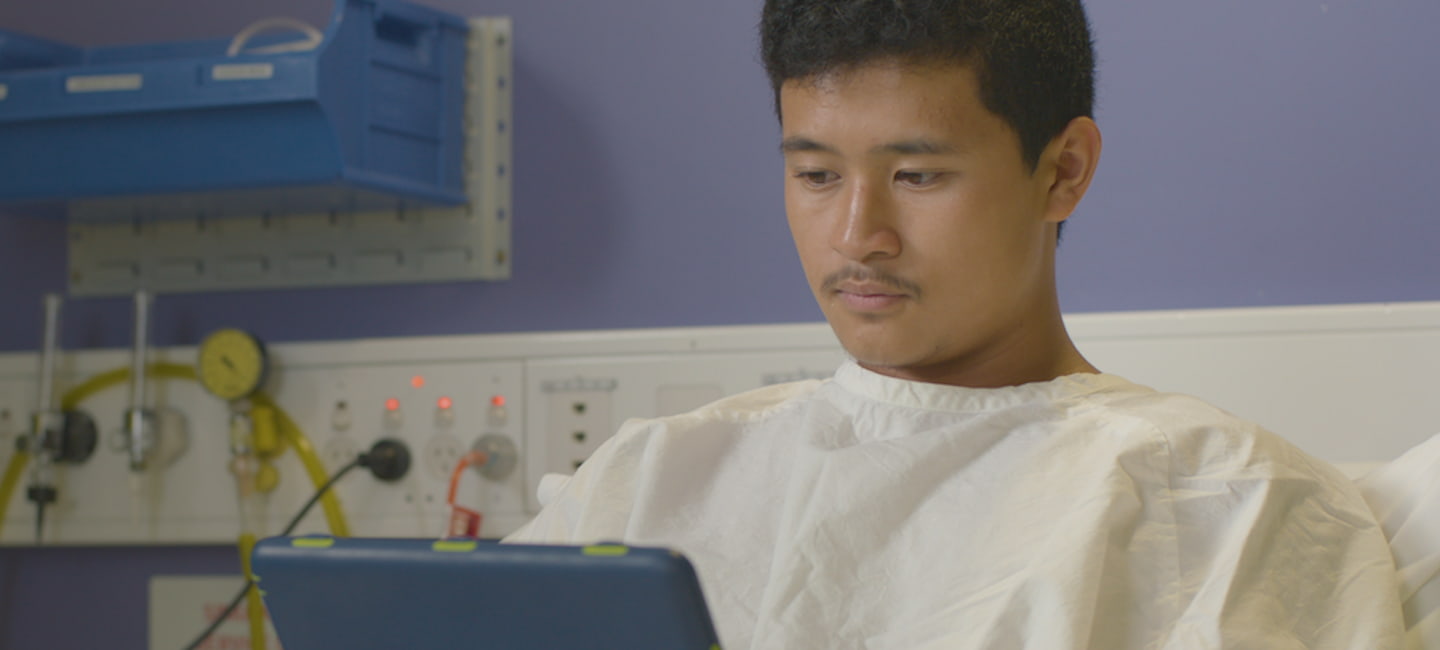Depending on what type of treatment you need to have, how much and how often, you may have to spend a lot of time at a hospital.
What happens in hospital?
When you are admitted, you will probably meet lots of administrative staff and different health professionals like nursing staff, oncologists, haematologists, surgeons and social workers.
They may ask you to repeat your story several times. It can help to have someone with you if you’re feeling unwell or overwhelmed.
They may ask personal questions. You can ask to speak with the doctors or nurses privately if you prefer. If you want to know how your information is stored or shared, ask your healthcare team.
Will I be in bed all day?
This will depend on the type of cancer and treatment you have. How long you stay in hospital can vary widely – from just a day in hospital to many weeks, or anywhere in between.
If you need to stay in hospital, your healthcare team will let you know how mobile you can be. For example, after surgery, you may be encouraged to get up and move around the ward to help you recover. If you’re having a chemotherapy infusion in a day unit, you may need to sit for some hours.
Other patients
Most hospitals are not designed for young people and lots of patients in hospital are going to be a lot older or younger than you. This can make hospital stays feel more challenging and isolating.
When you first get admitted, you will meet many other patients and their families in your day unit, ward or treatment centre. Some of the patients may be really sick and in different stages of their treatment. Some may be doing very well.
It can help to talk to other patients but remember everyone’s cancer and treatment is different.
What about visitors?
Each hospital will have different rules about who can visit, for how long and when. Ask your healthcare team about this. The rules may also be different if there are any restrictions.
In some cases, you may need to be in a room by yourself and the hospital might restrict who can visit you and when they can come. Your visitors might also have to wear a mask, gloves and hospital gowns to enter your room.
If you live in a rural or remote area
Cancer can have extra challenges if you live far from the city. If you are used to living in the country, having to travel to a big town or city for treatment might be really stressful.
You may be away from the support and comfort of your family and friends and miss your home, community, lifestyle and the food you usually eat. Being alone in an unfamiliar place can be hard and you might feel lonely, frightened or uncomfortable.
Cancer navigators at Cancer Hub – an initiative by Canteen, Camp Quality and Redkite – can help you and your family organise travel and a place to stay as well as other practical and emotional support. Visit cancerhub.org.au.
Living in a rural area can feel isolating enough, but being diagnosed with cancer at a young age on top of that was such a difficult experience. Even when I travelled hours for treatment, I never met anyone even close to my age that I could relate to. As soon as I joined Canteen and started using Canteen Connect I suddenly had all these people that understood what I was going through. Now I have friends from all around Australia and New Zealand and no longer feel so far away from everyone. Marnie, 25
Spending long periods in hospital can be really boring! So here are some tips to make your hospital stay a little easier:
- Ask friends to visit (and bring snacks).
- Start a journal.
- Use headphones and an eye mask to block out sound and light.
- Bring as much media as you can – laptop or tablet, books and magazines. Watch shows and listen to music on streaming services.
- Pack your pillows, photos and other favourite stuff to make the hospital room feel more like your own space.
- Have a bedwarming party. Your friends may not realise you want them to visit you in hospital. Invite them to come and hang out.
- Have Facetime chats, watch shows or movies together or a Zoom party.
- Make a visitor book or poster for visitors to sign and leave messages.
- Take pictures of people who visit.
- If you don’t feel like talking to anyone, silence your phone or make a “Do not disturb” sign to let people know you’re not up for visitors.
- Get to know the night nurses well. You can chat to them when you can’t sleep.
- Take control. Decide when you want visitors. Tell people if you don’t like the hospital food.
- Find your release – art and craft, knitting, reading, puzzles, games, crosswords.
- Download and try out a meditation app.
- Make plans about things you will do when you get out of hospital. It helps to have something to look forward to.
- If you don’t have enough energy to read, try an audiobook or podcast.
- Find out if there are other young people in hospital and see if you can meet up.
- Get outside the hospital or ward if you are well enough. Some fresh air and sunshine can make a nice change.
- Ask your friends or teachers to bring things from school, TAFE or uni for you to do.
- And remember the Youth Cancer Service team includes lots of people who can advise and help you cope with your time in hospital. Ask your cancer care coordinator or cancer nurse about the activities, groups, services and entertainment on offer.
Keep your mind busy and do the things you love. Listen to music, play games and watch movies. This is a time of your life where you can focus solely on yourself and your recovery. Fiona, 22
Going home from hospital
If you have been in hospital for a long period, you may be really looking forward to going home. So why can it feel scary when the day actually arrives?
While you are in hospital, there are always people fussing over you, telling you what to do, when to wake up, what to eat and what treatments you will be having.
So when you leave the hospital, you might miss this routine, people who understand your situation and the security of knowing you will be looked after if something goes wrong.
Re-adjusting to everyday life can be tough and people can often need some support in doing this. Keeping a routine at home can help. Lean into your family, friends and community wherever you can. They are the ones who know you best.
Professional support will still be there for you after you leave the hospital, from your healthcare team, your GP and organisations like Canteen.
Canteen Connect provides counselling and social support that can be really helpful during this period.
Going back into society is definitely hard when you have been in isolation for a while. For me, I went back out into the community with friends and family helping me, but it was too early. It’s important to know when you’re ready. Take your time in getting back out in society, even if it’s a short trip to your local coffee shop for a takeaway coffee. You don’t always need to keep up with friends. Go at your own pace and enjoy life. Amy, 25


















